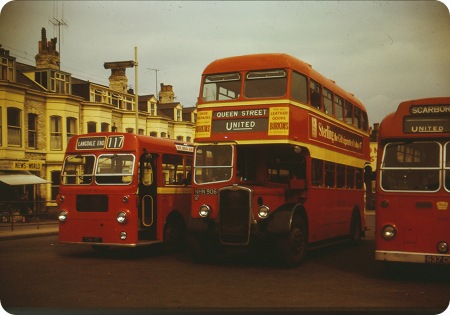
United Automobile Services
1950
Bristol K6B
ECW H30/26R
Here we have a line up of three United Automobile buses in Scarborough bus station. the one in the centre is as the specification above having a Bristol AVW 8.1 litre six cylinder diesel engine. In 1965 all United double decker buses had the Bristol engine, 20 had been converted from Gardner 5LW engine I think they needed the power of the Bristol engine.
The single decker on the left is a 1965 Bristol SUL4A registration CHN 3C fleet number S3 with an ECW B36F body. I think United only had five of these lightweight vehicles mainly used on lightly trafficked routes. There was two types of Bristol SU the SUS (Small Underfloor Short) and the SUL (Small Underfloor Long) both versions were powered by an Albion 4.1 litre, four cylinder diesel engine and had a 5 speed synchromesh gearbox
The bus on the right or should I say half a bus is a 1956 Bristol LS5G registration 637 CHN fleet number U237 with an ECW B41F body. There is a much better shot of a United Bristol LSG here.
28/10/15 – 13:22
NHN906 was the last surviving Bristol K6B in the United fleet. There were half a dozen of them at Scarborough for many years for use on the town services there. After they were displaced by new FLFs in the mid-sixties, they moved north to Northumberland. BH1 &2 (NHN 901/2) went to Whitley Bay where they were mainly used on the Whitley Bay town service. BH3-6 (NHN 903-6) went to Ashington. When United renumbered their fleet into an all numerical system at the beginning of 1969, there were only two survivors, BH1 & 6 which became 51 & 52. NHN 901 probably never operated with it’s new number. It was still in service in December 1968, but a few days into the new year, I noted that it was parked out of use behind the depot at Whitley Bay. NHN906 at continued for a few more months at Ashington. I occasionally saw it in the 444 from Bedlington to Ashington via North Blyth. It also sometimes appeared as a substitute for an FLF on the Newcastle services. It appears to have been taken out of service in June 1969.
John Gibson
29/10/15 – 06:21
Small correction to the original text. The SU had a five speed constant mesh (not synchromesh) gearbox. Behind the apparent uniformity of vehicle types in the Tilling fleets of the time lay a difference between operators in the engine choice. Some would not countenance anything other than a Gardner in double deck and large saloon orders. Others were happy to accept the Bristol engine which was cheaper to buy and speedier in delivery. Gardners were highly sought after by many manufacturers, and output was not particularly high. In retrospect, it testifies to the ultra conservative iron grip that Hugh Gardner maintained upon the company that production methods barely altered for over 50 years from the introduction of the LW series in 1931. Given the apparent insatiable demand for the Patricroft products, Gardner rested on its laurels, and no real effort to increase output was properly addressed. Back then, the idea that Gardner would ultimately cease to exist was inconceivable.
Roger Cox
Leave a Reply